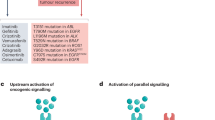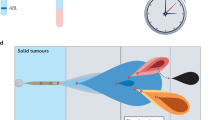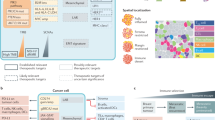Abstract
Cancer chemotherapy is in evolution from non-specific cytotoxic drugs that damage both tumour and normal cells to more specific agents and immunotherapy approaches. Targeted agents are directed at unique molecular features of cancer cells, and immunotherapeutics modulate the tumour immune response; both approaches aim to produce greater effectiveness with less toxicity. The development and use of such agents in biomarker-defined populations enables a more personalized approach to cancer treatment than previously possible and has the potential to reduce the cost of cancer care.
This is a preview of subscription content, access via your institution
Access options
Subscribe to this journal
Receive 12 print issues and online access
$209.00 per year
only $17.42 per issue
Buy this article
- Purchase on Springer Link
- Instant access to full article PDF
Prices may be subject to local taxes which are calculated during checkout
Similar content being viewed by others
References
Peppercorn, J., Perou, C. M. & Carey, L. A. Molecular subtypes in breast cancer evaluation and management: divide and conquer. Cancer Invest. 26, 1–10 (2008).
van de Vijver, M. J. et al. A gene expression signature as a predictor of survival in breast cancer. N. Engl. J. Med. 347, 1999–2009 (2002).
Rosenwald, A. et al. The use of molecular profiling to predict survival after chemotherapy for diffuse large B cell lymphoma. N. Engl. J. Med. 346, 1937–1947 (2002).
Potti, A. et al. A genomic strategy to refine prognosis in early stage non small cell lung cancer. N. Engl. J. Med. 355, 570–580 (2006).
Slamon, D. J. et al. Use of chemotherapy plus a monoclonal antibody against HER2 for metastatic breast cancer that overexpresses HER2. N. Engl. J. Med. 344, 783–792 (2001).
Lynch, T. J. et al. Activating mutations in the epidermal growth factor receptor underlying responsiveness of non-small-cell lung cancer to gefitinib. N. Engl. J. Med. 350, 2129–2139 (2004).
Amado, R. G. et al. Wild-type KRAS is required for panitumumab efficacy in patients with metastatic colorectal cancer. J. Clin. Oncol. 26, 1626–1634 (2008).
Hegi, M. E. et al. MGMT gene silencing and benefit from temozolomide in gliobalstoma. N. Engl. J. Med. 352, 997–1003 (2005).
O'Brien, S. G. et al. Imatinib compared with interferon and low-dose cytarabine for newly diagnosed chronic-phase chronic myeloid leukemia. N. Engl. J. Med. 348, 994–1004 (2003).
Demetri, G. D. et al. Efficacy and safety of imatinib mesylate in advanced gastrointestinal stromal tumors. N. Engl. J. Med. 347, 472–480 (2002).
Paik, S. et al. A multi-gene assay to predict recurrence of tamoxifen-treated, node negative breast cancer. N. Engl. J. Med. 351, 2817–2826 (2004).
Hayes, D. F. et al. Her2 and response to paclitaxel in node positive breast cancer. N. Engl. J. Med. 357, 1496–1506 (2007).
Olaussen, K. A. et al. DNA repair by ERCC1 in non small cell lung cancer and cisplatin-based adjuvant chemotherapy. N. Engl. J. Med. 355, 983–991 (2006).
Schuster, S. J. et al. Idiotype vaccine therapy (Biovax ID) in follicular lymphoma in first complete remission: phase III clinical trial results. J. Clin. Oncol. 27 (Jun 20 Suppl.), 2 (2009).
Innocenti, F. et al. Comprehensive pharmacogenetic analysis of irinotecan neutropenia and pharmacokinetics. J. Clin. Oncol. 27, 2604–2614 (2009).
Dezentjé, V. O., Guchelaar, H. -J., Nortier, J. W., van de Velde, C. J. & Gelderblom, H. Clinical implications of CYP2D6 genotyping in tamoxifen treatment for breast cancer. Clin. Cancer Res. 15, 15–21 (2009).
Schroth, W. et al. Breast cancer treatment outcome with adjuvant tamoxifen relative to patient CYP2D6 and CYP2C19 genotypes. J. Clin. Oncol. 25, 5187–5193 (2007).
Kris, M. et al. Efficacy of gefitinib, an inhibitor of the epidermal growth factor tyrosine kinase, in symptomatic patients with non small cell lung cancer. JAMA 290, 2149–2158 (2003).
Giaccone, G. et al. Gefitinib in combination with gemcitabine and cisplatin in advanced non-small-cell lung cancer: a Phase III trial — INTACT 1. J. Clin. Oncol. 22, 777–784 (2004).
Herbst, R. S. et al. Gefitinibin combination with paclitaxel and carboplatin in advanced non-small-cell lung cancer: a Phase III trial — INTACT 2. J. Clin. Oncol. 22, 785–794 (2004).
Mok, T. S. et al. Gefitinib or carboplatin-paclitaxel in pulmonary adenocarcinoma. N. Engl. J. Med. 361, 947–957 (2009).
Kobayashi, S. et al. EGFR mutation and resistance of non small cell lung cancer to gefitinib. N. Engl. J. Med. 352, 786–792 (2005).
Engelman, J. A. & Janne, P. A. Mechanisms of acquired resistance to epidermal growth factor receptor tyrosine kinase inhibitors in non small cell lung cancer. Clin. Cancer Res. 14, 2895–2899 (2008).
Engelman, J. A. et al. MET amplification leads to gefitinib resistance in lung cancer by activating ERBB3 signaling. Science 316, 1039–1043 (2007).
O'Reilly, K. E. et al. mTor inhibition induces upstream receptor tyrosine kinase signaling and activates AKT. Cancer Res. 66, 1500–1508 (2006).
Mandrekar, S. J. & Sargent, D. J. Clinical trial designs for predictive biomarker validation: theoretical considerations and practical challenges. J. Clin. Oncol. 27, 4027–4034 (2009).
Shepherd, F. A. et al. Erlotinib in previously treated non small cell lung cancer. N. Engl. J. Med. 353, 123–132 (2005).
Bradbury, P. A. et al. Economic analysis: randomized placebo-controlled clinical trial of erlotinib in advanced non-small cell lung cancer. J. Natl Cancer Inst. 102, 1–9 (2010).
Karapetis, C. S. et al. K-ras mutations and benefit from cetuximab in advanced colorectal cancer. N. Engl. J. Med. 359, 1757–1765 (2008).
Di Fiore, F. et al. Clinical relevance of KRAS mutation detection in metastatic colorectal cancer treated by cetuximab plus chemotherapy. Br. J. Cancer 96, 1166–1169 (2007).
Lievre, A. et al. KRAS mutations as an independent prognostic factor in patients with advanced colorectal cancer treated with cetuximab. J. Clin. Oncol. 26, 374–379 (2008).
Van Cutsem, E. et al. Cetuximab and chemotherapy as initial treatment for metastatic colorectal cancer. N. Engl. J. Med. 360, 1408–1417 (2009).
Allegra, C. J. et al. American Society of Clinical Oncology provisional clinical opinion: testing for KRAS gene mutations in patients with metastatic colorectal carcinoma to predict response to anti-epidermal growth factor receptor monoclonal antibody therapy. J. Clin. Oncol. 27, 2091–2096 (2009).
Shankaran, V., Bentrem, D. J., Mulcahy, M. F., Bennett, C. L. & Benson, A. B. III. Economic implications of kras testing in metastatic colorectal cancer (mCRC). American Association of Clincal Oncology website [online], (2009).
Mittmann, N. et al. Prospective cost-effectiveness analysis of cetuximab in metastatic colorectal cancer: evaluation of National Cancer Institute of Canada Clinical Trials Group CO.17 trial. J. Natl Cancer Inst. 101, 1182–1192 (2009).
Sartore-Bianchi, A. et al. Multi-determinants analysis of molecular alterations for predicting clinical benefit to EGFR-targeted monoclonal antibodies in colorectal cancer. PLOS One 4, e7287 (2009).
Author information
Authors and Affiliations
Ethics declarations
Competing interests
The author declares no competing financial interests.
Related links
Related links
DATABASES
OMIM
gastointestinal stromal tumours
FURTHER INFORMATION
Accelerating Development and Approval of Targeted Cancer Therapies
Rights and permissions
About this article
Cite this article
Schilsky, R. Personalized medicine in oncology: the future is now. Nat Rev Drug Discov 9, 363–366 (2010). https://doi.org/10.1038/nrd3181
Issue Date:
DOI: https://doi.org/10.1038/nrd3181
This article is cited by
-
Need for numbers: assessing cancer survivors’ needs for personalized and generic statistical information
BMC Medical Informatics and Decision Making (2022)
-
Identifying network biomarkers of cancer by sample-specific differential network
BMC Bioinformatics (2022)
-
driveR: a novel method for prioritizing cancer driver genes using somatic genomics data
BMC Bioinformatics (2021)
-
Predicting heterogeneity in clone-specific therapeutic vulnerabilities using single-cell transcriptomic signatures
Genome Medicine (2021)
-
Communicating tailored risk information of cancer treatment side effects: Only words or also numbers?
BMC Medical Informatics and Decision Making (2020)



